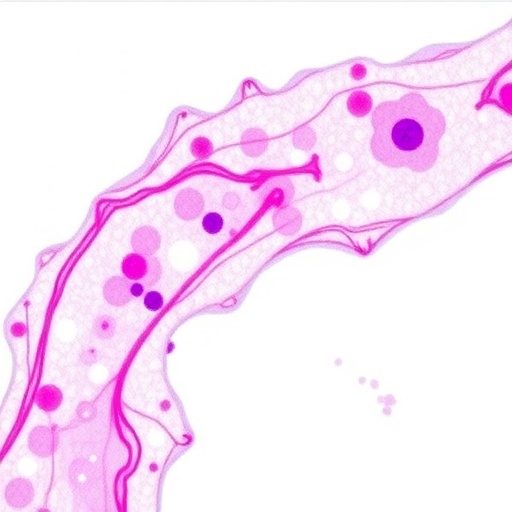In a groundbreaking study published in Reproductive Sciences, researchers have elucidated the complex roles of lactate-related genes in the pathology of endometriosis. Their findings suggest that elevated levels of lactate not only affect cellular metabolism but also might influence the behavior of endometrial stromal cells, which are critical in the development of endometriosis. The intricate interplay between environmental factors and genetic predispositions makes this research particularly significant, as it opens new avenues for potential therapeutic interventions.
Endometriosis is a debilitating condition that affects millions of women worldwide, characterized by the presence of endometrial-like tissue outside the uterine cavity. The hallmark symptoms of this disease include severe pelvic pain and infertility, yet the underlying mechanisms that drive its progression remain poorly understood. The insights gained from this study present an opportunity to better grasp the molecular dynamics that contribute to the disease, particularly through the lens of lactate-related signaling pathways.
The research team, led by Wang et al., conducted an integrated analysis of gene expression profiles associated with lactate metabolism. They utilized various bioinformatics tools to identify key lactate-related genes that could play a role in the pathophysiology of endometriosis. Notably, the authors emphasized the importance of S100A4, a member of the S100 protein family, which emerged as a novel marker linked to the invasive properties of endometrial stromal cells. These findings challenge existing paradigms and suggest that targeting S100A4 could potentially halt the progression of endometriosis.
A significant aspect of this research is the impact of lactate on cellular behavior. Lactate, often regarded simply as a byproduct of anaerobic metabolism, has garnered attention for its role as a signaling molecule in cancer and other pathological conditions. The study revealed that increased lactate levels could enhance the migratory and invasive abilities of endometrial stromal cells, indicating that these cells are responsive to metabolic cues. The implications of this are profound as they suggest that metabolic alterations in localized tissue could influence the overall disease trajectory.
The findings from Wang et al. provide a mechanistic explanation for the increased aggressiveness observed in endometriotic cells. The researchers demonstrated that the expression of S100A4 was upregulated in the presence of lactate, which in turn facilitated the migration and invasion of these cells into surrounding tissues. This vicious cycle of metabolic response and cellular behavior further complicates the management of endometriosis and highlights the necessity for a comprehensive understanding of the disease’s molecular underpinnings.
Moreover, the study introduces the concept of metabolic reprogramming in endometriotic cells, a phenomenon commonly observed in cancerous tissues. This reprogramming allows the cells to thrive and survive in unfavorable conditions, ultimately leading to the establishment and persistence of ectopic endometrial tissues. Furthermore, the researchers suggest that targeting S100A4 and the metabolic pathways involved in lactate metabolism may offer novel therapeutic strategies for patients suffering from endometriosis.
The researchers also noted that their findings could have broader implications beyond endometriosis, potentially extending to other diseases characterized by altered metabolism and cell migration. The notion that lactate serves not just as a metabolic substrate but as a potent signaling molecule could revolutionize our understanding of various pathologies, particularly those related to hormonal and reproductive health.
In light of these significant findings, future research should focus on the development of targeted therapies that can specifically inhibit the action of S100A4 or alter lactate metabolism in endometriotic tissues. Such innovative treatment modalities could significantly improve patient outcomes and decrease the burden of this chronic condition. With the ever-increasing body of evidence supporting the connections between metabolism and disease progression, the opportunities for novel interventions are both exciting and critical.
Furthermore, the ability to leverage advanced genomic and proteomic technologies will enhance our capacity to decipher the intricate networks that regulate endometriosis and similar disorders. As we deepen our understanding of the molecular and cellular mechanisms behind these conditions, personalized medicine approaches will likely emerge, enabling tailored treatments that address individual patient profiles.
In conclusion, the study by Wang et al. offers a compelling new perspective on the role of lactate-related genes in endometriosis, emphasizing the importance of S100A4 as a potential therapeutic target. This research not only provides clarity on the metabolic aspects of endometriosis but also reinforces the necessity for continued investigation into the molecular pathways that govern such complex diseases. As the scientific community grapples with these revelations, the hope is that we will move closer to effective and personalized treatment options for women suffering from endometriosis.
With this integrated analysis, the researchers have laid the groundwork for future studies to unravel the multifactorial nature of endometriosis and its intertwined relationship with metabolic pathways. The insights gleaned from their work inspire a more holistic view of this challenging condition, encouraging collaborative efforts to further enhance our comprehension and ultimately improve patient care.
Subject of Research: Integrated analysis of lactate-related genes in endometriosis.
Article Title: Integrated Analysis of Lactate-Related Genes Identifies S100A4 as a Novel Marker Promoting the Migration and Invasion of Endometrial Stromal Cell in Endometriosis.
Article References:
Wang, X., Chen, Y., Wu, Q. et al. Integrated Analysis of Lactate-Related Genes Identifies S100A4 as a Novel Marker Promoting the Migration and Invasion of Endometrial Stromal Cell in Endometriosis.
Reprod. Sci. 32, 2558–2573 (2025). https://doi.org/10.1007/s43032-025-01914-7
Image Credits: AI Generated
DOI: https://doi.org/10.1007/s43032-025-01914-7
Keywords: Endometriosis, lactate, S100A4, cell migration, cell invasion, metabolic reprogramming.




